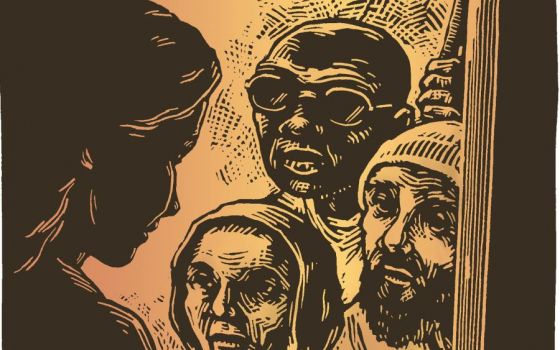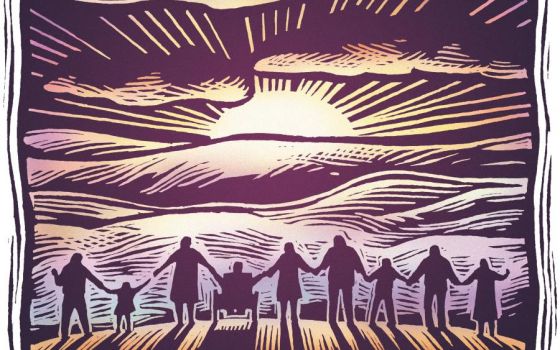
(Julie Lonneman)
After the great 90 days of Lent and Easter and the two great feasts that American Catholics celebrate on the two Sundays after Pentecost, June sees the return of the "green Sundays." Throughout the summer and for most of the next six months, we will be celebrating Sundays in Ordinary Time.
The Latin name for this period is actually tempus per annum, "time through the year." All time is sacred, and so this period is "ordinary" only in the sense that it is outside of the great liturgical seasons. There are in fact no ordinary Sundays, because every Sunday is the Lord's Day.
St. Jerome referred to Sunday as the "fundamental feast day." It was the first and only day set aside by the earliest generations of Christians: the day on which they remembered the resurrection of Christ and the sending of the Holy Spirit; the day on which they expected the Lord to return in glory; the day for gathering the community to hear God's word and to celebrate the breaking of bread.
In 1998, St. John Paul II published a beautifully poetic apostolic exhortation titled Dies Domini ("The Lord's Day"), in which he outlined the theological importance of Sunday, the centrality of the Sunday celebration of the Eucharist in the life of the church, and the implications of Sunday observance for the Christian life. The Universal Norms on the Liturgical Year and the General Roman Calendar underline the prominence of Sunday by recalling the principle articulated at the Second Vatican Council that "Sunday must be considered the primordial feast day."1
While Christians as early as the second century observed Easter as the yearly celebration of Christ's death and resurrection, Sunday had already been firmly established from the earliest times as the weekly festival of the Paschal Mystery and thus as the day par excellence for celebrating the Eucharist. Even the great Easter feast draws its importance primarily from its place as a Sunday among other Sundays.
Singing is regarded in Roman Catholic liturgical documents as a normal part of worship, but its use is guided by the principle of progressive solemnity, which "includes not only the nature and style of the music, but how many and which parts of the rite are to be sung."2 Musical choices for any Sunday should reflect the character of the Lord's Day as the first and most important feast day and give expression to the festivity that attends the weekly celebration of Christ's Paschal Mystery. While the style of the music on the Sundays of Ordinary Time might be somewhat less jubilant than at Easter and a bit more festive than during Lent, the parts of the Mass to be sung should remain fairly consistent, including the Gloria, which has been a Sunday hymn in the Roman rite for nearly 1,500 years, omitted only on the Sundays of Advent and Lent.
Advertisement
The General Instruction of the Roman Missal emphasizes the importance of singing on Sunday, directing that "every care should be taken that singing by the ministers and the people not be absent in celebrations that occur on Sunday and on Holydays of Obligation."3 This norm would seem to discourage the practice of scheduling an early Sunday Mass without music. At the same time, it suggests that communities with limited musical resources or that gather very early in the morning might sing fewer parts of the Mass and use simpler musical settings, keeping in mind of course the more important parts to be sung, such as the acclamations and dialogues.
Sunday, the original Christian feast day, is a day for singing — even in Ordinary Time, even in the summer. It is a day for keeping festival as we remember the dying and rising of Jesus by doing as he commanded us: to break the bread and share the cup in his memory.
Notes
1 Universal Norms on the Liturgical Year and the General Roman Calendar, 4; cf. "Constitution on the Sacred Liturgy," Sacrosanctum concilium, 106.
2 U.S. Conference of Catholic Bishops, "Sing to the Lord: Music in Divine Worship," 112.
3 General Instruction of the Roman Missal, 40.
Editor's note: This reflection was originally published in the June 2015 issue of Celebration.








